Student Union
ACLU Sues School District, Says Native American Students Faced Discrimination
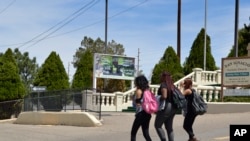
The American Civil Liberties Union of New Mexico Wednesday sued the state’s largest school district and a former teacher over a 2018 incident where the teacher allegedly cut a Native American student’s hair during class on Halloween and asked another student if she was dressed as a “bloody Indian.”
The ACLU’s complaint against Albuquerque Public Schools and the former teacher, Mary Jane Eastin, contends she created a hostile learning environment and discriminated against McKenzie Johnson, who is Navajo. The group also claims the school district failed to properly train teachers and provide for student safety.
The lawsuit follows discrimination charges filed in May 2019 with the New Mexico Human Rights Bureau by Johnson. The school district denied the allegations and the bureau did not reach a determination, clearing the way for the lawsuit.
Case would set precedent
The case is aimed at establishing a clear precedent that New Mexico’s anti-discrimination protections extend to students in public schools, said Preston Sanchez, an attorney at the ACLU of New Mexico. It also seeks unspecified financial damages.
“Not only must we ensure Native American students feel safe behind school walls, but we must also do everything in our power to ensure that they are treated with the dignity and respect they deserve,” Sanchez said.
School officials declined to comment on the case. Eastin has an unlisted phone number and it wasn’t immediately clear if she had an attorney.
The school district’s superintendent issued a public apology after the allegations emerged and told parents that Eastin would not return to Cibola High School, where she taught English.
School officials said later that Eastin’s employment with the school district ended in 2018 but did not disclose if she quit or was fired. They also said they would address racism and cultural sensitivity at all schools in the district.
Cultural sensitivity
Leaders from the Navajo Nation had called on the district to provide cultural sensitivity training. While they described the teacher’s acts as part of a “Halloween stunt,” they said one teen’s parents told them it was traumatizing.
According to the lawsuit, Eastin had dressed as a voodoo witch on Halloween and planned a game for her advanced English class in which she asked students questions and then rewarded those who answered correctly with marshmallows and gave dog food to those who answered incorrectly.
The lawsuit states that at one point, Eastin approached a Native American student and asked her if she liked her braids and then allegedly cut the tip of the girl’s hair with scissors.
Eastin also was accused of then asking another student, identified as Johnson, if she was dressed as a “bloody Indian.” The girl’s mother later told reporters her daughter was dressed for Halloween as Little Red Riding Hood with a red paw mark on her face.
The ACLU contends in the complaint that Johnson’s reputation was harmed and that she suffered personal injuries, including emotional distress.
Johnson has since recounted her story during school board meetings and at a Native American community forum hosted by the school district. She has said more needs to be done to address cultural sensitivity in Albuquerque’s schools.
See all News Updates of the Day
- By VOA News
Michigan State international students get their own space
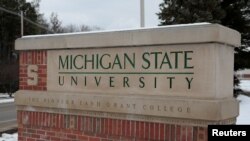
Michigan State University in East Lansing, Michigan, is setting aside a space in the International Center for international students.
Nidal Dajani, vice president of the school's International Student Association, said that the club plans to use the space to host events and hopes to collaborate with other student groups.
- By Dylan Ebs
International students find community during Pride Month
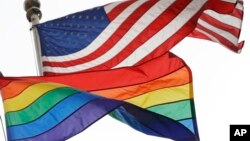
For LGBTQ+ international students, Pride Month, observed in June, is a unique time to reflect.
They hold on to multiple identities — both their LGBTQ+ identity and their cultural background — but coming to terms with them is not always easy.
For graduate student David Zhou, these identities can feel conflicting as transgender rights in China remain a controversial issue and spaces for LGBTQ people close. Zhou, 25, is transgender and pursuing an education in the STEM field at an urban university in the Midwestern United States.
VOA is using a pseudonym for Zhou’s first name and is not naming his university to protect his identity due to safety concerns back home in China. Zhou is not open about his transgender identity to his family.
During Pride Month, Zhou said he attended multiple LGBTQ+ events in his community and is surrounded by a supportive group of LGBTQ+ students who can relate to his experiences. But he’s not open about his identity to everyone on campus and said he doesn’t disclose his preferred pronouns to everyone to avoid transphobic comments.
“I feel like I have to make some judgments of the character of that person to see if they’re a good person to disclose [my identity] to,” Zhou said.
Zhou’s Pride Month celebrations included attending local markets with LGBTQ+ vendors and hanging out with his LGBTQ+ friends.
“They normalized being trans and for a long time I feel like trans identity is, should I say a vulnerability, brings me fear and worrying about discrimination, but having those events are helpful because it allowed me to see that queer people could just [live] openly,” he said.
At social events where few international students are present, Zhou said it can be tough to fit in.
“There's a lot of times like when they were talking about things I kind of, don't really understand, mostly because I kind of lack some background experience or knowledge,” he said.
Zhou said he is not aware of specific groups for LGBTQ+ international students at his university, but said international students are more prevalent in graduate programs and therefore find representation in organizations for LGBTQ+ graduate students.
In China, transgender individuals must obtain consent from an “immediate family member,” even for adults hoping to transition, which critics say limits the autonomy of transgender individuals while supporters say the policy protects doctors from violence by upset parents.
Struby Struble, a former coordinator of the University of Missouri LGBTQ+ Resource Center, told NAFSA: Association of International Educators in 2015 that LGBTQ+ international students face a “double barrier” on campus.
“With their international student friends, they feel isolated because they’re the LGBT one,” she said. “But then among the LGBT students on campus, they feel isolated because they’re the international one.”
Nick Martin, associate director of the Q Center, Binghamton University’s LGBTQ+ student support office, said when international students tour the center, there’s often a sense of hesitation as they enter a type of space that may not be present in their home country.
“I compare that to a year in after they've come into the space, they've again, maybe come to some of our events, they've got more connected,” he said.
Martin said graduate students have a unique interest in the Q Center as they may use the office for research and advocacy purposes that align with their studies.
“For older students, there may be hesitancy in a different way, but I think it's more in the vein of they want to do some of the advocacy work,” he said.
Martin said he thinks about how both his office and BU’s international student office can support students who come from countries with few — if any — protections for LGBTQ+ individuals.
“It's been a learning process of what those students really need, but I think I've kind of learned that a lot of students are just looking for the safe space that we offer,” Martin said.
- By VOA News
International students discuss US campus culture shock

International students at De Anza College in Cupertino, California, talked about culture shock in an article in La Voz News, the student newspaper.
"It felt like a major culture shock. Everything was so different, from academics to mannerism," said a student from Mexico.
Read the full story here.
These are the most expensive schools in the US
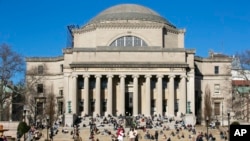
High tuition costs along with housing and food expenses can add up for students at U.S. colleges and universities.
MSNBC looked at the most expensive schools in the country, with one costing more than $500,000 for a bachelor’s degree. (June 2024)
Uzbekistan students admitted into top US universities
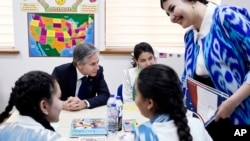
Students from Uzbekistan are among the international students admitted to top colleges and universities in recent years.
Gazata.uz profiled some of the Uzbekistan students attending Harvard, Brown, Princeton and other U.S. universities. (June 2024)






